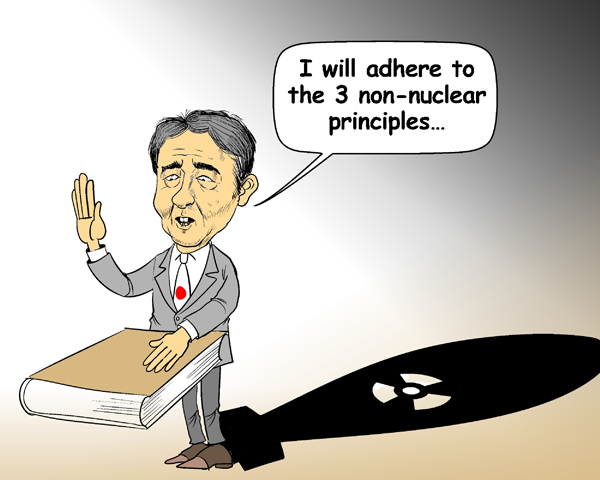Abe's quixotic quest for constitutional change
- By Liu Shigang
 0 Comment(s)
0 Comment(s) Print
Print E-mail China Daily, March 4, 2014
E-mail China Daily, March 4, 2014
After becoming Japanese prime minister for the second time, Shinzo Abe made it clear that revising Japan's pacifist Constitution is one of his political goals. Currently, Abe's Cabinet is trying to change the interpretation of the Constitution to allow Japanese Self-Defense Forces to exercise the right to collective self-defense.
|
|
|
Three, two, one... zero [By Jiao Haiyang/China.org.cn] |
Once a breakthrough is made in the key issues concerning constitutional revision, it will radically change the country's pacifist Constitution, which will seriously challenge the postwar international order, and inevitably undermine the alliance between Japan and the Untied States and hurt the interests and authority of the US.
After World War II, under the guidance of the supreme command of the allied powers, Japan adopted its current Constitution, which stipulates that Japan adheres to the path of peaceful development. Article 9 reads: "The Japanese people forever renounce war as a sovereign right of the nation and the threat or use of force as means of settling international disputes" and that in order to accomplish this aim "land, sea, and air forces, as well as other war potential, will never be maintained. The right of belligerency of the state will not be recognized."
Since coming to power in 1955, the Liberal Democratic Party has made changing the Constitution its political platform. In 1957, during the administration of Nobusuke Kishi, Abe's grandfather, an investigation committee was set up for the first time in a bid to promote constitutional revisions. But the "1955 system", under which the LDP was the dominant political party, collapsed in 1993 without the dream of a revised Constitution being realized.
With Japanese politics turning right again after entering the 21st century, the calls for a new constitution, focusing on rewriting the second paragraph of Article 9 to allow clearly the existence of military forces and the right to collective self-defense, have become louder.







Go to Forum >>0 Comment(s)